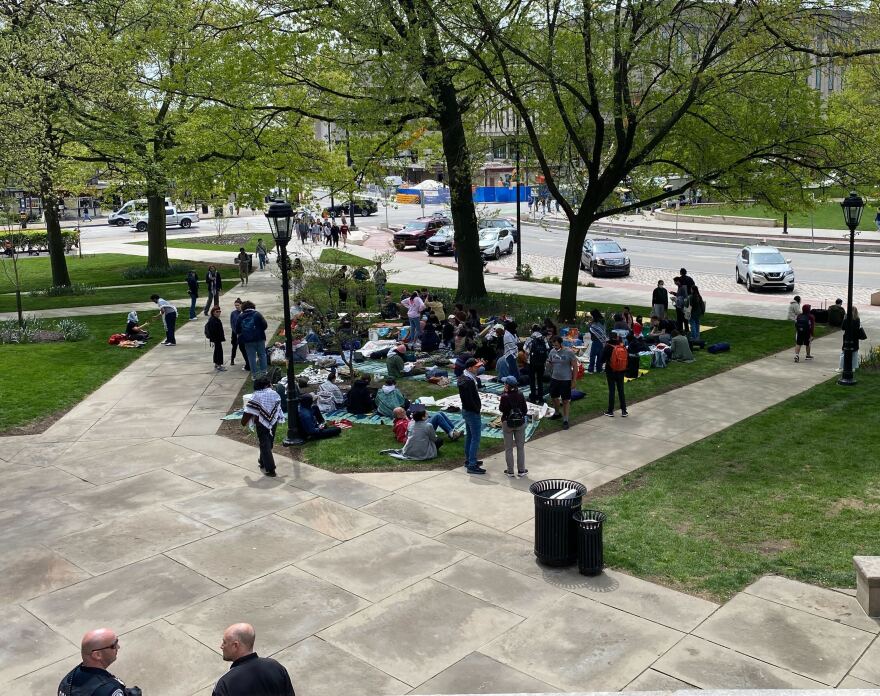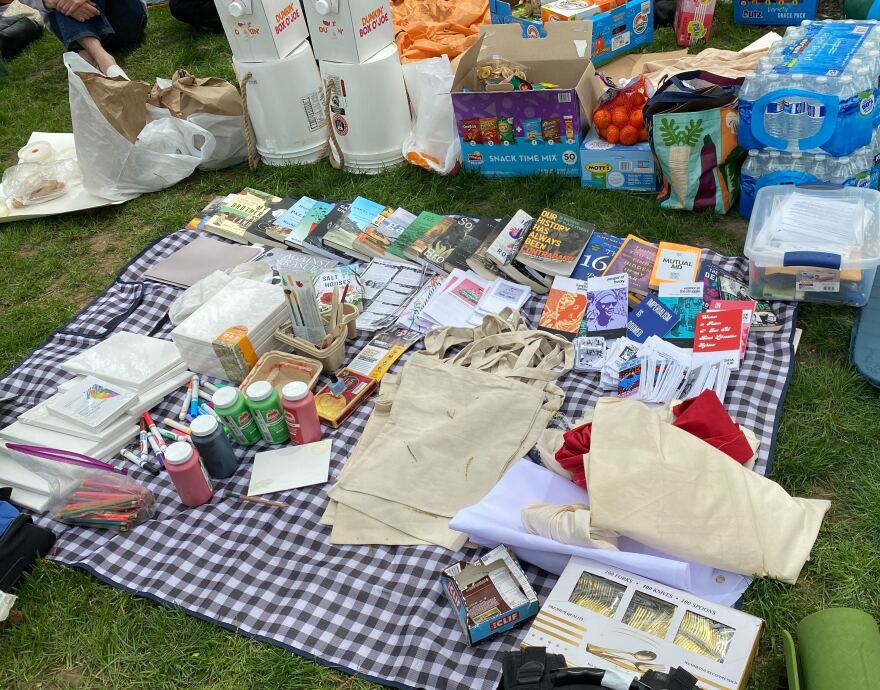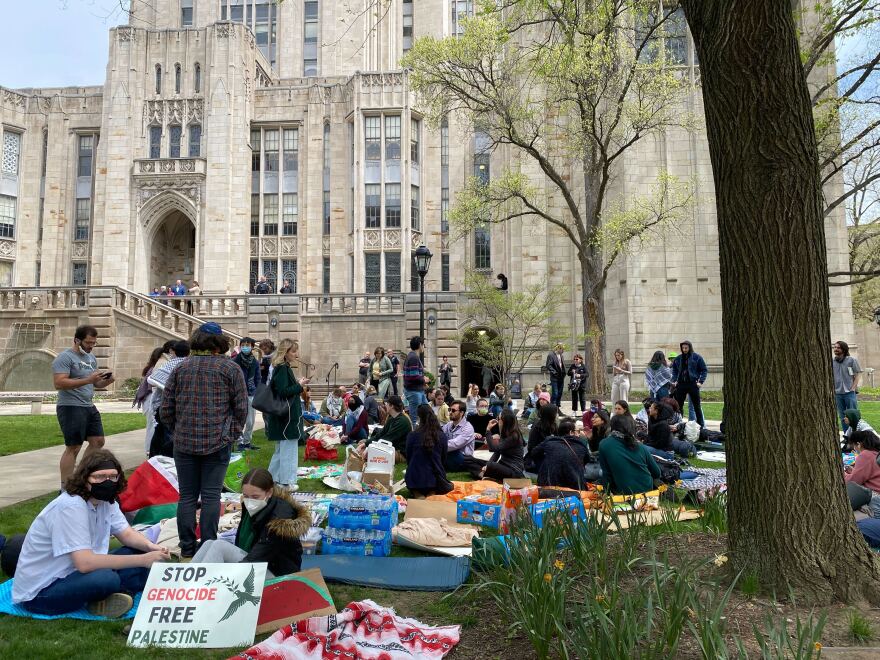Amid continued tensions and violence in Gaza and Israel, students at the University of Pittsburgh organized a sit-in outside of the Cathedral of Learning on Tuesday.
“We're just here in solidarity with Palestinians at a time where they don't have universities, to use our university privilege to make something,” said Samuel Weiner, a master’s student in Pitt’s teaching department.
Designating the sit-in as a “liberated zone,” the students are demanding that Pitt disclose and divest from any investment ties it has to the Israeli government, reject normal relations with Israel including Israeli universities and acknowledge what the students refer to as the “ongoing genocide in Gaza.”
The protest is the latest local example of the fallout that has followed the October 7 attack on Israel by Hamas, the military and political organization that controls the Gaza Strip. Around 1,200 Israelis were killed in that attack and more than 240 were taken hostage. Israel’s retaliatory strikes in Gaza have killed more than 30,000, according to the Gazan health ministry.
The protest initially started inside of the Cathedral before 10 a.m. with about 15 students. Pitt administration then told the protesters to move outside, where they set up on a patch of grass near Bigelow Boulevard. Joined by community members, the group grew in size to over 50 people by mid-afternoon. According to organizers and the protest flier, the group intends to occupy the space until Friday or as long as possible.
University spokesperson Jared Stonesifer said Pitt affirms the right students and community members have to organize peaceful protests. He added that students were asked to move given that the space they were occupying outside of the Cathedral is not designated as an event space.
“University of Pittsburgh administrators communicated with the demonstrators multiple times over the course of several hours and requested that they move to a different location,” Stonesifer said. “During those conversations, information regarding the demonstrators’ rights and responsibilities, including reminders regarding space reservation guidelines and expectations of student organizations, was shared with the demonstrators.
The demonstration continued to grow in size throughout the day. Later on Tuesday afternoon, according to Stonesifer, both campus and City of Pittsburgh police asked the group to move to Schenley Plaza. Upon relocating to Schenley around 4:30 p.m., students started to set up tents and planned to stay the night.
Across the country, several other colleges have staged similar multi-day anti-war demonstrations to stand in solidarity with Palestinians and push their universities to divest from Israeli institutions. Students at Columbia University were the first to occupy a designated protest space on their campus as a “liberated zone” last week, drawing inspiration from previous student movements at the school.
According to Weiner, pro-Palestine students at Pitt have talked about staging similar sit-ins before. He said seeing the demonstrations at Columbia sparked them to do the same.
“They gave us a big fire in our hearts to see other college kids do it and be really successful,” Weiner said.

Weiner noted that while a few counter-protesters have appeared with Israeli flags, the group has no intention of engaging in conflict and aims to keep the protest peaceful.
“I'm Jewish and there's a lot of Jewish organizers here,” Weiner said. “We know that it's not antisemitic to criticize the state, and we know that Zionism is not Judaism.”
A board member of the Student Coalition for Israel at Pitt was unable to comment immediately as they were attending a Passover Seder.
At Columbia, New York University and Yale, hundreds of students were arrested for trespassing and many were suspended for setting up encampments.
Sam Schmidt, a legal observer and community organizer, said it is unclear whether Pitt police will force students to disperse or start making arrests.
“The protesters have already been asked to leave, and that didn't happen,” Schmidt said. “[Pitt is] basically refusing to say how they will escalate, if they choose to escalate. So we're not really sure how the police will act.”
Schmidt said she thinks arrests are unlikely given that it's the end of the semester, but if Pitt did take action against the students it would potentially involve internal disciplinary processes.
Student organizers said the group was asked to move on multiple occasions by Pitt administration. They were also asked to take down tents and signs, which the administration said violated the student code of conduct for protests.
A Pitt student protester, who identified as Palestinian and asked to remain anonymous, said she hopes the protest will show the university that students are committed to calls for divestment. Other demonstrators echoed that sentiment.
“Our number one demand is not just divestment, but disclosure of investments,” Weiner said. “Because this university, like others, refuses to disclose.”
Pitt, indeed, does not fully disclose donors for its $5.5 billion endowment or its investments in foreign companies.
Weiner noted that Pitt also has ties to military technologies through Department of Defense contracts within the engineering school and environmental science departments.

Kate Daher from the Pittsburgh Palestine Solidarity Committee came to the demonstration to show her support for students. She said the non-violent demonstration is an expression of students’ First Amendment rights.
Daher noted that this is not the first time in U.S. history that activists have used sit-ins to bring about change, citing the auto worker strikes in the 1930’s and the lunch counter sit-ins in the 1960’s.
At Pitt, previous student sit-ins have also brought about University actions. In 2020, students held a weeklong demonstration inside the Cathedral of Learning to push Pitt to divest from fossil fuel companies — this led the University to commit to carbon neutrality by 2037. In 1969, the Black Action Society’s computer center takeover also brought many changes for Black students at Pitt.

